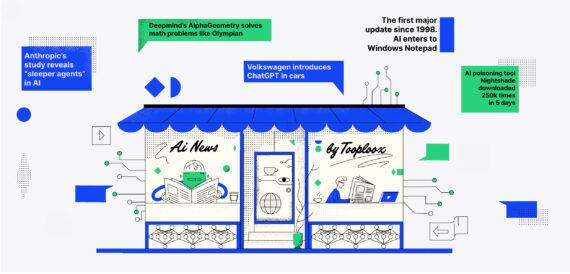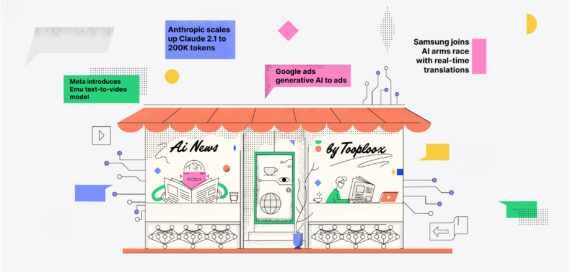Artificial Intelligence in e-commerce is reshaping the business landscape with its transformative capabilities. Here, we’ll explore how AI is revolutionizing the sector through automation and enhancing the decision-making process.
The retail AI market is estimated to grow from $7.14B in 2023 to $55.53B by 2030, showing its pivotal role in the industry’s future. According to Statista, retail leaders can see the potential of AI in different areas: 73% believe it can enhance profitability and productivity, 72% see it as beneficial for customer satisfaction, 69% for innovation, 66% for understanding the market and consumers, and 65% for reducing new product expenses.
This blog post delves into Artificial Intelligence in ecommerce, how it inspires leaders, enhances operations, customer experiences, and the industry’s future, especially for big enterprises.
What is Artificial Intelligence (AI)
AI, or Artificial Intelligence, emulates human intelligence, using data and patterns to make predictions or take actions. AI technologies, powered by popular algorithms like diffusion models for image generation and transformers for language processing, are leading advancements. While Generative AI leverages algorithms like GPT-3, driving creativity by producing content from user prompts. These technologies are reshaping business as well as everyday experiences.
What is generative AI
Generative AI uses user prompts to create desired content, like art, music, or text, by learning and repeating patterns from existing input data. Notably, popular models like GPT-3 and other technologies using generative AI are driving adoption.
According to McKinsey, one-third of respondents are already using generative AI in their organizations, constituting 60% of those who have already adopted AI. 40% of AI-adopting organizations plan to increase AI investments due to generative AI’s impact, and 28% have it on their board’s agenda. This underlines generative AI’s influence on strategic decisions, hinting at its promising trajectory and wide-ranging applications in the future.
Understanding AI in Ecommerce
The use of AI on e-commerce platforms involves leveraging AI’s advanced capabilities and machine learning tools to analyze data. It can power automation, help predict consumer behavior, and optimize operations. We’ll explore its transformative applications in modern online businesses.
- Tackling fraud
Amidst thriving e-commerce, global payment fraud is a pressing issue, predicted to hit $48 billion by 2023. The surge is evident, tripling from $9.84 billion in 2011 to a staggering $32.39 billion in 2020, with projections for 2027 reaching an alarming $40.62 billion—25% higher than the 2020 figures. E-commerce retailers, facing an average of 206,000 monthly web attacks, are a prime target.
AI-powered fraud detection can provide crucial defense, swiftly identifying potential threats, safeguarding against financial losses, and reinforcing trust in transactions.
- Automating customer support
AI tools for e-commerce, such as chatbots, in customer support, can ensure 24/7 assistance, a critical factor in retaining customers. Negative contact center experiences prompt 60% of consumers to switch brands. For 70% of brands, customer service directly influences performance and brand loyalty, a sentiment echoed by 97% of consumers and 98% of contact center managers. The pivotal role of superior customer service in brand loyalty is evident, making efficient, AI-driven support a necessity in modern business strategies.
- Efficient Logistics Management
Using AI in ecommerce optimizes logistics by providing metrics to predict demand, helping to manage inventory, and recommending efficient shipping routes, thus tackling the “Traveling Salesman Problem.” It has the potential to significantly enhance delivery times and cost-efficiency in the global e-commerce logistics market, which is poised to grow by $404.84 bn between 2023-2027.
This transformative technology helps forecast demand, aids in minimizing excess stock, and can provide recommendations to refine supply chains—a growing aspect of modern supply chain management to help ensure customer satisfaction and maintain that competitive edge, ultimately enhancing delivery times and reducing costs.
- Predictive Analytics for Inventory Management
Leveraging AI solutions for ecommerce in predictive analytics for inventory management can help address imbalances in supply and demand. Presently, US-based retailers grapple with excess inventory, holding approximately $1.43 in stock for every $1 of sales—a financial imbalance demanding a fix.
Implementing AI-driven inventory optimization has proven promising in reducing overstock and subsequently curtailing substantial warehouse expenses, notably the considerable $5.08 per square foot cost prevalent in US warehouses and distribution centers. Efficient inventory management emerges as a necessity for substantial cost savings and heightened operational efficiency in the fiercely competitive retail sphere.
- Voice commerce
The rapid surge in voice commerce, growing by an impressive 321.74% in the last two years (2021-2023), is reshaping the retail landscape. Consumer preferences fuel this swift evolution, with 22% choosing to make direct purchases via voice commands and 17% using it for reorder requests. Notably, 71% of consumers display a preference for voice-placed queries over manual typing. The integration of AI-powered voice recognition technology has fundamentally shifted the retail paradigm, offering enhanced convenience and accessibility to customers seeking a seamless shopping experience.
- Recommendation engines and personalization
AI commerce’s role in personalizing user experience is significant, particularly in the online retail domain. By analyzing a user’s past purchases and browsing behavior, AI can tailor the user’s homepage to showcase products aligned with their preferences. Notably, personalized recommendations contribute to a substantial 30% of eCommerce site revenues (Barilliance).
As the digital landscape evolves, Oracle predicts that AI will come to handle a remarkable 70% of all customer interactions. This underscores the transformative impact and growing reliance on AI in delivering tailored and engaging consumer experiences in the e-commerce realm.
- Visual search engines
Visual Search and Image Recognition, facilitated by AI, is also transforming e-commerce. Users can search for products using images, enriching their shopping experience and aiding in seamless product discovery. The significance of this is evident as 36% of consumers have utilized visual search engines, with over half emphasizing the importance of visual information over text while shopping online.
Moreover, 55% of consumers acknowledge that visual search tools significantly influence their style and taste. Online behavior mirrors this shift, with image-based searches accounting for 27% across major search properties. The integration of AI in visual search options is undeniably reshaping how consumers interact with e-commerce platforms, emphasizing the power of visual information in the shopping journey.
- Real-time decision making
Real-time Insights in e-commerce, provided by AI, can be transformative. Through the vigilant monitoring of website traffic, AI provides the data needed to make swift adjustments, guaranteeing a seamless browsing experience and personalized interactions for each user. This optimization significantly enhances user satisfaction and engagement, crucial factors for achieving success.
The ability to adapt and tailor the user experience in real-time positions AI as an indispensable tool for modern e-commerce, enhancing not only customer satisfaction but also overall business performance. Some awesome ChatGPT prompts can be a great support.
- Data-driven decision making
In modern business, AI-enhanced Data-Driven Decision Making is paramount. AI helps distill actionable insights from vast quantities of data, informing choices in marketing, inventory, and customer preferences.
Also, 64% of marketing executives affirm data-driven marketing’s crucial role in the global economy. It’s fundamental for customer acquisition (54%) and retention (50%). And 67% of marketers believe it boosts decision speed and accuracy.
Notably, 91.9% of organizations gained measurable value from data investments in 2023. Data fuels innovation in 3 out of 5 organizations. 56% of data leaders plan to increase their budgets, emphasizing the centrality of data-driven strategies.
In this data-abundant era, AI-powered analytics is indispensable for informed, agile, and innovative decision-making, cementing its position as a cornerstone in modern business strategies.
Summary
AI-powered commerce plays a pivotal role in e-commerce, enabling data-driven decisions and enhancing user experience. It’s key to modern marketing strategies, inventory management, and customer satisfaction. Global spending on AI in e-commerce is predicted to surpass $8 billion by 2024, highlighting its growing significance.
Read also: How To Choose A Dev Shop






